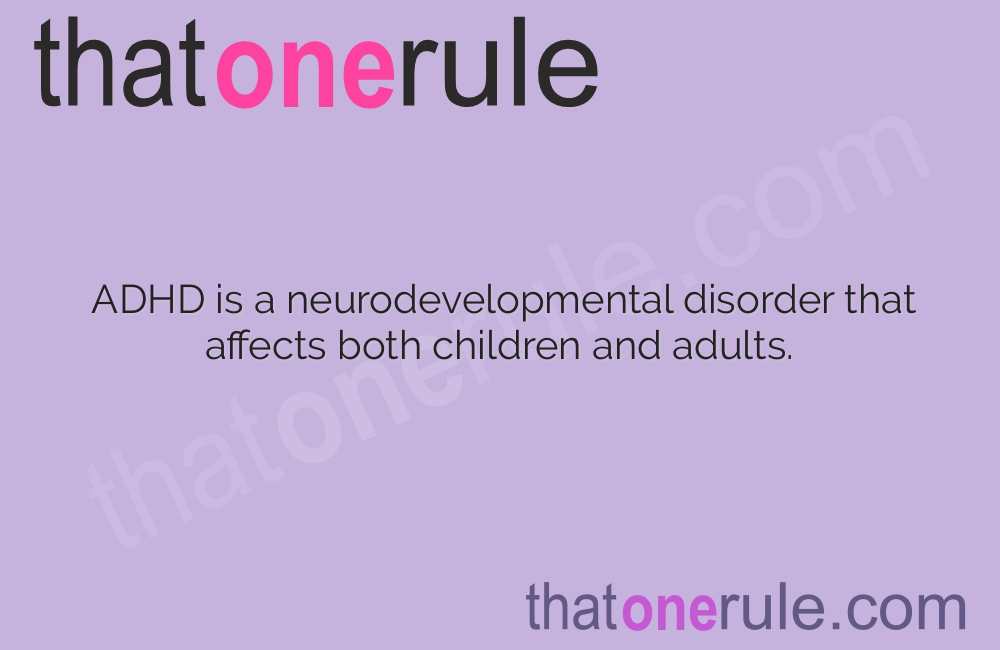7 Fascinating Facts About ADHD

ADHD is a neurodevelopmental disorder that affects both children and adults.
People with ADHD often have difficulty focusing and paying attention.
ADHD is not caused by bad parenting or lack of discipline.
There are three subtypes of ADHD: inattentive, hyperactive-impulsive, and combined.
ADHD is more common in boys than in girls.
Many successful individuals, such as Michael Phelps and Albert Einstein, have ADHD.
ADHD is characterized by an imbalance of neurotransmitters in the brain.
People with ADHD often have difficulty with time management and organization.
ADHD is diagnosed through a comprehensive evaluation that considers both behavioral and neurological factors.
Medication, therapy, and lifestyle modifications can be effective in managing ADHD symptoms.
People with ADHD often have heightened creativity and think outside the box.
ADHD is not a reflection of intelligence or capability.
Children with ADHD often struggle in school due to their difficulty with focus and impulsivity.
Adults with ADHD may have challenges in their professional and personal lives.
ADHD is a lifelong condition; however, symptoms can be managed and improved with appropriate interventions.
People with ADHD may have difficulty with emotional regulation and impulse control.
ADHD has both genetic and environmental factors contributing to its development.
ADHD is commonly associated with other mental health conditions, such as anxiety and depression.
7 Fascinating Facts About ADHD part 2
Some individuals with ADHD may exhibit symptoms of hyperfocus, where they can become deeply concentrated on a task they find interesting.
ADHD is often misunderstood, leading to stigma and discrimination.
People with ADHD are not lazy or unmotivated; they simply struggle with certain tasks more than others.
ADHD can have a significant impact on relationships, both personal and professional.
Individuals with ADHD may excel in certain areas when their interests align with their abilities.
ADHD can present challenges in a work or academic setting, but accommodations can be made to support success.
ADHD is not outgrown; however, symptoms may change as a person matures.
People with ADHD may have difficulty with impulse control, leading to risky behavior.
ADHD is associated with an increased risk of substance abuse and addiction.
ADHD can affect sleep patterns, leading to difficulties with falling asleep and waking up.
Individuals with ADHD may experience racing thoughts and difficulty with mental quietness.
ADHD can cause challenges in social settings, such as difficulty reading social cues and maintaining conversation.
Children diagnosed with ADHD are often at a higher risk for academic underachievement and lower educational attainment.
Adults with ADHD may experience challenges with executive functions, such as planning and prioritizing tasks.
ADHD can affect an individual’s sense of time, leading to difficulty with punctuality and time management.
People with ADHD often have heightened sensitivity to sensory stimuli, such as noise and touch.
ADHD can impact self-esteem and self-worth, especially when individuals face constant criticism and misunderstanding.
Individuals with ADHD may benefit from alternative learning methods and environments that cater to their unique needs.
ADHD can lead to difficulties with impulse control, resulting in impulsive spending or decision-making.
People with ADHD may have difficulty with task initiation and completion, particularly when it comes to mundane or repetitive tasks.
ADHD is associated with an increased risk of accidents and injuries due to impulsivity and inattentiveness.
Individuals with ADHD may have intense emotions and mood swings.
ADHD can affect appetite and weight management, leading to an increased risk of obesity.
People with ADHD often have a high degree of energy and may struggle with sitting still for extended periods.
ADHD can impact self-regulation and self-control, making it challenging to resist immediate gratification.
Individuals with ADHD may have strengths in certain areas, such as creativity, problem-solving, and thinking outside the box.
ADHD is a condition that affects millions of people worldwide, and greater awareness and understanding are essential for proper support and inclusion.

